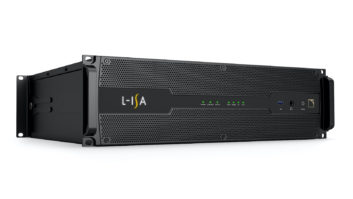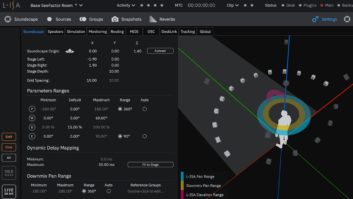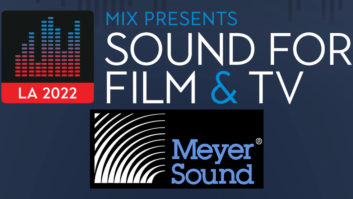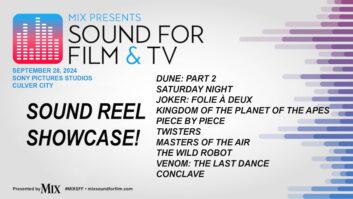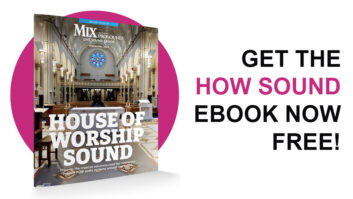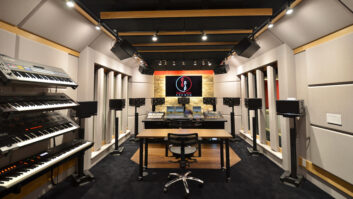Newly installed in Sound Emporium’s Studio B is a 48-channel API Legacy Plus. NASHVILLE, TN—Since 1969, Nashville’s Sound Emporium Studios has operated just off of what is known as Music Row—and more than geographically. A comfortable five minutes or so from the Row on Belmont Blvd., Sound Emporium has, from its beginning, hosted clients creating their best work outside of music industry norms, working quite comfortably in the fringes.

For example, as Music Row chased and defined the zeitgeist of Today’s Country Music, Sound Emporium was hosting Todd Rundgren in 1969 at the very beginning of his solo career; R.E.M. in 1987 for the recording of the band’s breakthrough album, Document; and, 20 years later, unusual masterpiece sessions for the oddly genius pairing of Robert Plant and Alison Krauss on Raising Sand.
Today, Sound Emporium remains such a unique Nashville studio. Its rooms are truly vibey, so they’re very conducive to live tracking, and are now anchored by two classic analog consoles ideal for their respective environments: in Studio A, a 48-channel Neve VRP, and, newly installed in Studio B, a 48-channel API Legacy Plus.
The more you learn about legendary recording studios, the more you’ll understand that the best are launched by at least one unique character—and Jack “Cowboy” Clement was Sound Emporium’s original character and founder. A songwriter/musician turned record producer, Clement produced Jerry Lee Lewis in Memphis and ultimately worked with the likes of Johnny Cash, Elvis Presley, B.B. King, U2 and many others.
“Cowboy was the Rebel of Music Row back in the day,” explains Sound Emporium studio manager Juanita Copeland, who has been at the studio since her original employer, producer Garth Fundis, purchased it in the mid-’90s. “Cowboy flipped his finger to everything [the Row] said was a rule and did it his way. He did everything against the grain, yet built amazing rooms that have sounds and vibes that are second to none. You can feel it; it’s palpable. So, yes—our funky vibe all started with Cowboy. People called him the Pied Piper of Nashville, and that’s exactly what he was—people followed him here. It helped forge this unique area of town, too; as we weren’t on the Row, we’ve always had a certain allure.”
Copeland attests that passionate ownership remains at the heart of Sound Emporium’s success. “Thankfully, when Garth sold the studio, it was to someone who appreciated the history and wanted to preserve it. In today’s Nashville— most recently brought to light with Ben Folds’ public movement to preserve RCA Studio A—we’re lucky. Garth could’ve sold to anybody. But he sold to George and Chad Shinn, who have given me the financial resources to keep thriving. [The Shinn family is best known as former owners of the NBA’s Charlotte Hornets, etc.—Ed.] The fact is, most studios don’t make money; you’re lucky if you break even. But we’re doing better than that: We’re making improvements, employ a really talented, dedicated staff, and love what we do. Further, from a business standpoint, we do things differently from the other studios in town. We don’t have interns; we hire people and grow engineers.”
Over the past few years, explains Copeland, requests for a new console in the sonically ‘live’ sounding Studio B trickled in from clients. “Having a broader range of musical genres already—more alt-country and alt-rock—a lot of those producers and engineers love API. That has been a noticeably steady shift since 2006-2007. We’ve had more clients that really tend to lean toward that API sound.”
Sean Shannon, Sound Emporium’s technical engineer, was soon looking for an appropriate console replacement. “Our previous console in B—a Trident 80B—was a good, workhorse console for a long time, yet it only had five auxes, 32 sends, 24 returns and no automation capabilities. With our new API Legacy Plus, we have 12 auxes, 48 sends and 48 returns, 48 inputs, and Uptown 2 automation. The Legacy Plus is a flexible console and a big step forward in functionality. Its sonic quality is unbelievable—from the transformers to the 2520 opamps to the overall super-strong build quality. It’s laid out in a user-friendly way, and the patch bay allows patching in and out of pretty much every feature of the console independently.”
Gathered around Sound Emporium’s new API Legacy Plus are (l-r): Juanita Copeland, General Manager; Derek Parnell, Assistant Engineer; Sean Shannon, Studio Technician; Mike Stankiewicz, Lead Assistant Engineer; Owen Lewis, Assistant Engineer; Amanda Miller, Assistant Engineer; Matt Lombardi, Assistant Engineer; Matt Andrews, Engineer Consultant; Chad Shinn, CEO/Owner. Rob Dennis—the owner of Rack- N-Roll Audio, a Nashville highend pro audio gear sales and rental firm—has serviced Music Row since the late ’90s and brokered Sound Emporium’s Legacy Plus purchase. “The console was newly sold to Eminem,” tells Dennis. “Apparently, Dr. Dre soon showed up and barely used it, saying something to the effect of, ‘you don’t mix hip-hop records on an API; you need an SSL 9000.’ So they immediately put it in storage and bought an SSL 9000. Later, it came to Big Kenny [of Big & Rich fame], who was building a studio. He’s had it since 2002 and it served him really well. Then about a year and a half ago, he reached out to me to see if I wanted to broker it.”

Having worked the Nashville studio scene for nearly 20 years, Dennis was passionate about keeping Big Kenny’s Legacy Plus in town. “I don’t know whether they even remember this, but I reached out to Juanita and Sean, saying, ‘You need an API.’ And when Big Kenny reached back out to me, the timing finally was right.
“I had some potential out-of-town buyers, but my goal was to keep this desk down the street and in Nashville. And when it landed at my friend’s studio, I was so happy. I’ve seen too many great consoles leave town already; it’s great for those that get them, but, in this case, it was a win-win: Kenny got what he wanted, Sound Emporium got what they wanted, and there’s another API up-and-running in Nashville.”
For Shannon, finding the API he needed just minutes from the studio was ideal. “It was literally five minutes from the studio, so I could look at it, do some tests, and make sure that the overall footprint in the room worked for us. I did the decommissioning of the console myself, so I knew where everything came from, and when I put it back together at our place, it all made sense to me. I didn’t have to decode things, buzz-out the ends of cables, and so on. Also, the Legacy Plus has an outboard patchbay, so the length of the cabling determined where we were going to position it. That’s something to consider when decommissioning and re-installing a console: label and measure everything.”
In many ways, the three decade-long analog-to-digital movement in Nashville has come to a conclusion; it’s one where large-format analog consoles have found a comfortable place in the overall landscape, no longer vanishing at such an astonishing, arguably heartbreaking rate. Regardless of mixing techniques and the hard-to-define, aesthetic needs of “vibe,” an analog console is still the best solution for ensemble-based live instrument tracking.
“From my vantage point, people have figured it out: They want a world-class cue system and zero latency,” explains Dennis. “What’s unique about Nashville is that everything is recorded off the floor, often with six or seven musicians, and the quickest way to make that happen, cue-wise, is with an analog console. There really is no substitute. We’re still building world-class home studios in Nashville; we actually just built one for Lee Brice. But is he going to track there? No. We’re also seeing younger people who have ‘grown’ their home studios with the addition of analog consoles for these same reasons. They’re not necessarily mixing through them, but tracking, yes.”
Sound Emporium
soundemporiumstudios.com


